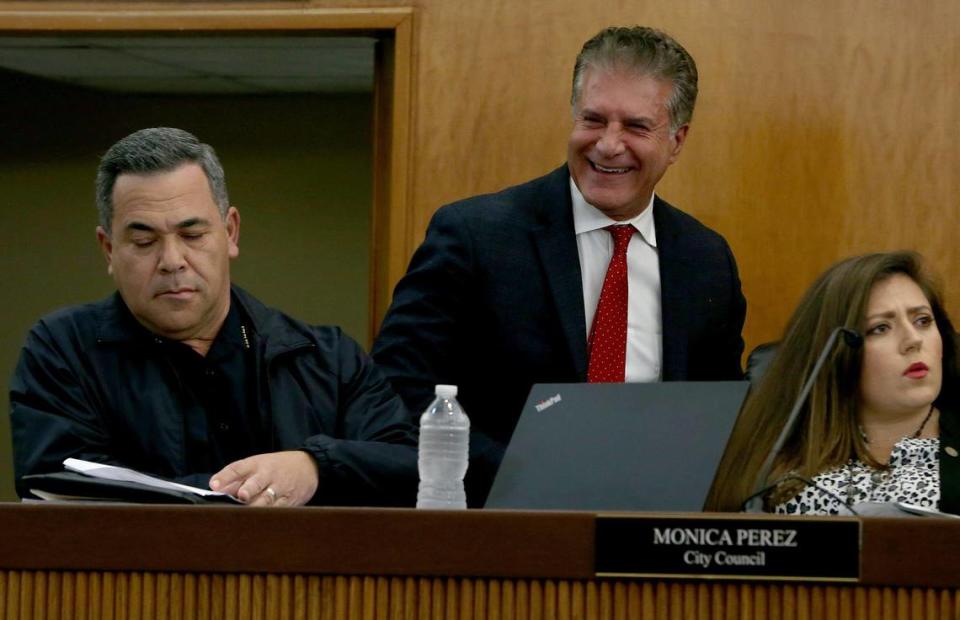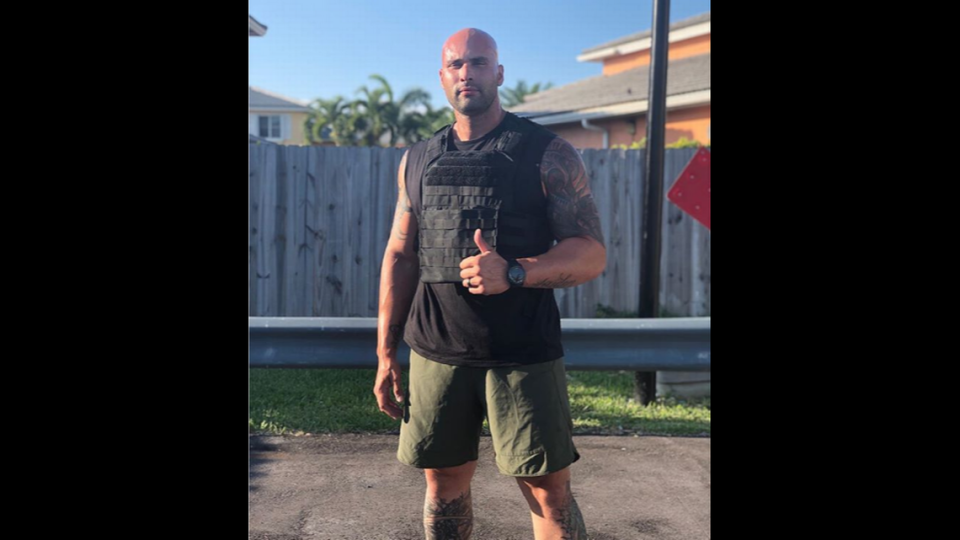In court, Hialeah chief heaped praise on tax cheat with history of clashes with cops
When Raul Sosa Sr., a Hialeah junkyard and tow-truck company operator, needed a character witness to testify in his multimillion-dollar tax-evasion trial, he called on a friend: Hialeah Police Chief Sergio Velázquez.
Although Sosa had a long history of arrests, including one for allegedly pointing a gun at a Miami police officer, Velázquez nonetheless appeared before a jury — wearing his police uniform. Sosa’s defense team was eager to highlight the chief’s law enforcement credentials.
“From your uniform I think we all know what you do for a living,” Rick Diaz, Sosa’s lawyer, said in federal court on Nov. 6, 2015, as Velázquez took the stand. “You are a police officer, right?”
“Yes,” Velázquez replied. “I’m the chief of police for the city of Hialeah.”
The chief’s decision to testify for a wealthy and politically connected defendant at his trial was highly unusual. Normally, cops appear for the prosecution. Sosa not only had a rap sheet with 12 convictions in state court but had also displayed contempt for police, according to a court filing, once spitting in an officer’s face, kicking him in the groin and yelling racial obscenities while being booked into jail. Velázquez’s testimony, in contrast, cast Sosa as a law-abiding and charitable businessman.
“A police chief in uniform can make a big impression on the jury,” said John Byrne, a Miami lawyer who prosecuted the Sosa case and said he was surprised the chief agreed to appear. “It’s a powerful thing.”
While there is no law or rule prohibiting a police officer from testifying for the defense, a legal ethics professor at Nova Southeastern University law school said officers “should not testify voluntarily” and “certainly should not show up in uniform.”
NSU law school professor Robert Jarvis said the “optics are terrible” because the chief testifying in his uniform sent a “false image” to the jury that the Hialeah community and police department stood behind the 57-year-old defendant, Sosa. “By wearing a police uniform, you’re not talking about your personal experience with the defendant, you’re talking on behalf of the city,” Jarvis said. “That is wrong.”

During his testimony, the chief extolled what he described as Sosa’s generosity as a philanthropist, including donating a computer and equipment to a quadriplegic boy and sponsoring events such as K-9 and SWAT demonstrations for the Hialeah Police Department.
“He is an honest person,” Velázquez said. “I see him as a hardworking businessperson who is very much a family man.”
At a city meeting this past week, Velázquez declined to comment when asked why he testified on behalf of Sosa. His spokesman did not respond to an email.
In addition to the chief’s testimony, Hialeah Mayor Carlos Hernández’s then-chief of staff, Arnie Alonso, wrote a letter on behalf of Sosa and his wife, Maura, who also faced tax evasion charges. Hernández appointed Velázquez as chief in 2012. The mayor did not respond to a request for comment.
In the end, the efforts did not spare the couple from being found guilty and sent to prison. The jury found the Sosas had failed to report at least $4.5 million in business profits, and a judge ordered the couple to pay the Internal Revenue Service about $1.5 million in back taxes and serve prison time.
Sosa’s wife was the sole shareholder of her husband’s business, Accion 1 Auto Sales, and helped him operate the company. Together, they filed joint tax returns from 2004 through 2008, the five years in which they were accused of failing to report all of the firm’s income that flowed to them.
In 2018, Sosa, known in Hialeah as the “junkyard millionaire,” and his son, Raul Sosa Jr., would plead guilty to paying bribes to an Opa-locka politician and a city lobbyist to obtain a towing contract.
Testifying for Sosa was far from the first time Velázquez’s judgment has faced scrutiny.
His conduct as chief has come into question since the Miami Herald reported last year on the case of a Hialeah patrol sergeant accused of sexually assaulting four women, including two minors. The Herald found that the chief returned the sergeant, Jesús Menocal Jr., to active duty in 2016 while he was still under investigation by the Miami-Dade State Attorney’s Office — even giving him a raise — and then kept him on the street despite the FBI beginning its own investigation.
Menocal was arrested at Hialeah Police headquarters this past December and charged with violating the civil rights of two women by detaining and sexually assaulting them. He was fired and pleaded not guilty to the federal charges.
‘Quite the model citizen’
Before his arrest, Sosa ran Accion 1, a tow truck and car recycling business, in Hialeah.
In court, Velázquez said he often dropped by Sosa’s business, starting when he served as a police commander in charge of the district where Accion 1 was located. Velázquez described his visits as part of a community policing effort. The future chief said he joined Sosa twice a month for a morning coladita to talk about the concerns of local business owners. During those visits, he saw the frenetic Sosa in action, dealing with customers, directing employees and often displaying generosity to those in need.
“I have seen customers go there and ask for things, and then he just will take care of them, you know, and they would walk away,” the chief testified. “No charge.”
It was a different picture than the one painted by federal prosecutors,
At Sosa’s sentencing hearing, the government presented a laundry list of his previous crimes to a federal judge.
“This case is far from the defendant’s first brush with the law,” prosecutor Michael Davis wrote in a court filing, noting Sosa’s 12 prior state convictions, including four felony offenses, although they had only cost him a total of 36 days in jail. Among Sosa’s convictions: two residential burglaries, carrying a concealed firearm, and aggravated assault, according to the filing. The assault charge stemmed from a 1995 case in which Sosa was accused of pointing a gun at a Miami police officer, Davis wrote.
At the hearing, U.S. District Judge Michael Moore read off every one of Sosa’s prior offenses, starting with his criminal conduct soon after his arrival during the Mariel boatlift from Cuba in 1980.
The judge sarcastically called Sosa “quite the model citizen.”

But Sosa’s defense attorney, Diaz, downplayed his client’s criminal history, portraying him as a victim of an “essentially mafia-controlled” tow-truck and scrap-metal industry. He said Sosa’s principal business rival in Miami carried out a drive-by shooting of Sosa’s junkyard and “firebombed” his vehicles. He noted several of Sosa’s arrests arising from those and other incidents in Miami resulted in little to no jail time.
In court papers, Diaz also disputed the allegation that Sosa pointed a firearm at a Miami police officer. He said the aggravated assault charge was trumped up when Miami police arrested him at the end of 1995. Court records show Sosa eventually pleaded no contest to a reduced charge of aggravated assault without a firearm and was sentenced to time served, or two days in jail. He then sued four Miami cops and the city in a federal suit claiming he was falsely arrested and won a $775,000 judgment.
“So, while on the one hand, Mr. Sosa has no tolerance for disrespectful and discourteous police officers, he highly honors those who perform honorably,” Diaz wrote in a sentencing memo.
It was precisely to cast Sosa in a more positive light that Diaz called the chief as a “friendly” character witness. And though he gave Velázquez a subpoena to ensure his appearance in court, the police chief had agreed to be a witness on Sosa’s behalf, Diaz told the Herald in a recent interview. Diaz said Velázquez wore his uniform as a witness because under Hialeah police policy he was on duty and therefore required to do so. (The city did not immediately provide a copy of the policy.)
“I saw value in the fact that before he was the police chief he had been a commander involved in community policing and had developed a real relationship with my client,” said Diaz, a defense attorney who formerly worked as an officer with the Miami-Dade Police Department and grew up in Hialeah. “He had a lot of exposure with Sosa, a lot of continuity with Sosa. ... I was trying to establish that [Sosa] was law-abiding.”
Despite Velázquez’s testimony, a jury found the couple guilty. The judge sentenced Sosa and his wife to prison terms of 6 1/2 and four years, respectively, in 2016.
Unbeknownst to the jury, Velázquez himself had a blemished record as a police officer in Hialeah.
After joining the city’s police force in the early 1990s, he committed a string of major disciplinary infractions, according to internal affairs documents obtained by the Herald and published late last year. The incidents saw Velázquez face a suspension, a criminal investigation, demotion from lieutenant to sergeant and a recommendation from Hialeah’s then-police chief that he be fired. The episodes included:
▪ In 1999, Velázquez, then a sergeant, left his post in his patrol car without authorization in order to go to Miami Beach to help his wife obtain a refund from a travel agency, investigators found. He was wearing his uniform while he insisted the agency issue a refund.
▪ In 2002, Velázquez, then a sergeant, began a romantic relationship with a woman he had approached at a Hialeah police station after one of his officers had arrested her for driving under the influence, according to an internal affairs report. When paperwork from her arrest disappeared from the station, the Miami-Dade State Attorney’s Office opened a criminal investigation but did not determine that Velázquez or anyone else had tampered with evidence. A recommendation from Hialeah’s then-police chief that he be fired was overruled by Raul Martínez , the city’s mayor at the time. Velázquez was given a 30-day suspension instead.
▪ In 2005, Velázquez, by then a probationary lieutenant, got into serious trouble again after he was suspected of concocting false battery and cocaine charges in a domestic dispute as an off-duty favor to a family friend, internal affairs records show. Martínez bumped him back down to sergeant, at the chief’s recommendation. Martínez’s successor as mayor, Julio Robaina, later reinstated Velázquez to lieutenant.
Velázquez wasn’t the only public figure to testify on Sosa’s behalf at his tax evasion trial.
Richard Dunn, a pastor and former Miami city commissioner, also appeared. Like the chief, Dunn said Sosa was a generous businessman who had provided free towing services for his church and also donated as much as $10,000 to the congregation.
He said he considered Sosa “a friend … a brother.”
“I think the word,” Dunn said, “is hermano.”
Miami Herald researcher Monika Leal contributed to this report.

